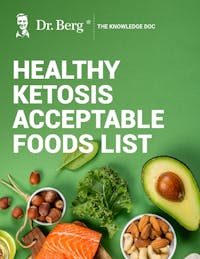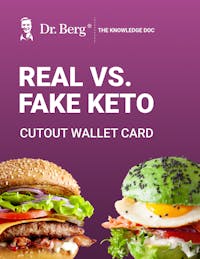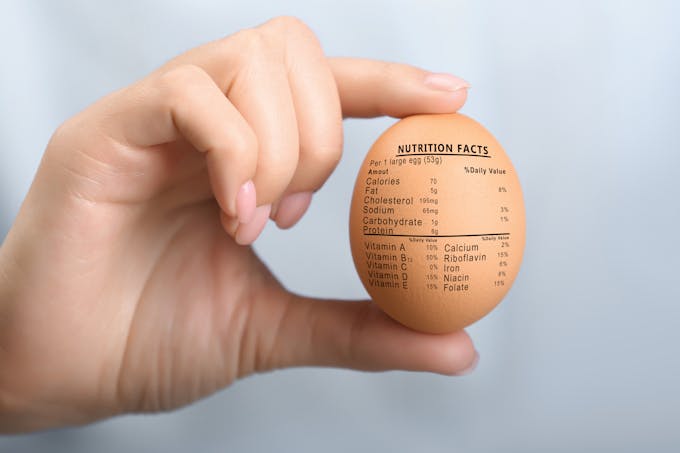Why You Should Eat 4 Eggs a Day

Healthy Keto Acceptable Foods List
Explore a comprehensive list of foods and beverages that align with Healthy Keto®
Identify which foods support fat-burning and metabolic health
Discover nutritious options for fats, proteins, and vegetables to support your health goals
Learn about common foods that aren’t Healthy Keto-approved

Healthy Keto Acceptable Foods List
Explore a comprehensive list of foods and beverages that align with Healthy Keto®
Identify which foods support fat-burning and metabolic health
Discover nutritious options for fats, proteins, and vegetables to support your health goals
Learn about common foods that aren’t Healthy Keto-approved

Healthy Keto Acceptable Foods List
Explore a comprehensive list of foods and beverages that align with Healthy Keto®
Identify which foods support fat-burning and metabolic health
Discover nutritious options for fats, proteins, and vegetables to support your health goals
Learn about common foods that aren’t Healthy Keto-approved

Healthy Keto Acceptable Foods List
Explore a comprehensive list of foods and beverages that align with Healthy Keto®
Identify which foods support fat-burning and metabolic health
Discover nutritious options for fats, proteins, and vegetables to support your health goals
Learn about common foods that aren’t Healthy Keto-approved

Healthy Keto Acceptable Foods List
Explore a comprehensive list of foods and beverages that align with Healthy Keto®
Identify which foods support fat-burning and metabolic health
Discover nutritious options for fats, proteins, and vegetables to support your health goals
Learn about common foods that aren’t Healthy Keto-approved

Healthy Keto Acceptable Foods List
Explore a comprehensive list of foods and beverages that align with Healthy Keto®
Identify which foods support fat-burning and metabolic health
Discover nutritious options for fats, proteins, and vegetables to support your health goals
Learn about common foods that aren’t Healthy Keto-approved

Healthy Keto Acceptable Foods List
Explore a comprehensive list of foods and beverages that align with Healthy Keto®
Identify which foods support fat-burning and metabolic health
Discover nutritious options for fats, proteins, and vegetables to support your health goals
Learn about common foods that aren’t Healthy Keto-approved

Healthy Keto Acceptable Foods List
Explore a comprehensive list of foods and beverages that align with Healthy Keto®
Identify which foods support fat-burning and metabolic health
Discover nutritious options for fats, proteins, and vegetables to support your health goals
Learn about common foods that aren’t Healthy Keto-approved

Healthy Keto Acceptable Foods List
Explore a comprehensive list of foods and beverages that align with Healthy Keto®
Identify which foods support fat-burning and metabolic health
Discover nutritious options for fats, proteins, and vegetables to support your health goals
Learn about common foods that aren’t Healthy Keto-approved

Healthy Keto Acceptable Foods List
Explore a comprehensive list of foods and beverages that align with Healthy Keto®
Identify which foods support fat-burning and metabolic health
Discover nutritious options for fats, proteins, and vegetables to support your health goals
Learn about common foods that aren’t Healthy Keto-approved

Healthy Keto Acceptable Foods List
Explore a comprehensive list of foods and beverages that align with Healthy Keto®
Identify which foods support fat-burning and metabolic health
Discover nutritious options for fats, proteins, and vegetables to support your health goals
Learn about common foods that aren’t Healthy Keto-approved

Healthy Keto Acceptable Foods List
Explore a comprehensive list of foods and beverages that align with Healthy Keto®
Identify which foods support fat-burning and metabolic health
Discover nutritious options for fats, proteins, and vegetables to support your health goals
Learn about common foods that aren’t Healthy Keto-approved

Healthy Keto Acceptable Foods List
Explore a comprehensive list of foods and beverages that align with Healthy Keto®
Identify which foods support fat-burning and metabolic health
Discover nutritious options for fats, proteins, and vegetables to support your health goals
Learn about common foods that aren’t Healthy Keto-approved

Healthy Keto Acceptable Foods List
Explore a comprehensive list of foods and beverages that align with Healthy Keto®
Identify which foods support fat-burning and metabolic health
Discover nutritious options for fats, proteins, and vegetables to support your health goals
Learn about common foods that aren’t Healthy Keto-approved

Keto vs. Non-Keto
Quickly compare keto-friendly foods with non-keto options for easy reference
Use this wallet card to make informed food choices while shopping or dining out
Identify fake keto foods and ingredients that you should avoid
Simplify decision-making with clear, practical guidelines

Keto vs. Non-Keto
Quickly compare keto-friendly foods with non-keto options for easy reference
Use this wallet card to make informed food choices while shopping or dining out
Identify fake keto foods and ingredients that you should avoid
Simplify decision-making with clear, practical guidelines

Keto vs. Non-Keto
Quickly compare keto-friendly foods with non-keto options for easy reference
Use this wallet card to make informed food choices while shopping or dining out
Identify fake keto foods and ingredients that you should avoid
Simplify decision-making with clear, practical guidelines

Keto vs. Non-Keto
Quickly compare keto-friendly foods with non-keto options for easy reference
Use this wallet card to make informed food choices while shopping or dining out
Identify fake keto foods and ingredients that you should avoid
Simplify decision-making with clear, practical guidelines

Keto vs. Non-Keto
Quickly compare keto-friendly foods with non-keto options for easy reference
Use this wallet card to make informed food choices while shopping or dining out
Identify fake keto foods and ingredients that you should avoid
Simplify decision-making with clear, practical guidelines

Keto vs. Non-Keto
Quickly compare keto-friendly foods with non-keto options for easy reference
Use this wallet card to make informed food choices while shopping or dining out
Identify fake keto foods and ingredients that you should avoid
Simplify decision-making with clear, practical guidelines

Keto vs. Non-Keto
Quickly compare keto-friendly foods with non-keto options for easy reference
Use this wallet card to make informed food choices while shopping or dining out
Identify fake keto foods and ingredients that you should avoid
Simplify decision-making with clear, practical guidelines

Keto vs. Non-Keto
Quickly compare keto-friendly foods with non-keto options for easy reference
Use this wallet card to make informed food choices while shopping or dining out
Identify fake keto foods and ingredients that you should avoid
Simplify decision-making with clear, practical guidelines

Keto vs. Non-Keto
Quickly compare keto-friendly foods with non-keto options for easy reference
Use this wallet card to make informed food choices while shopping or dining out
Identify fake keto foods and ingredients that you should avoid
Simplify decision-making with clear, practical guidelines

Keto vs. Non-Keto
Quickly compare keto-friendly foods with non-keto options for easy reference
Use this wallet card to make informed food choices while shopping or dining out
Identify fake keto foods and ingredients that you should avoid
Simplify decision-making with clear, practical guidelines

Keto vs. Non-Keto
Quickly compare keto-friendly foods with non-keto options for easy reference
Use this wallet card to make informed food choices while shopping or dining out
Identify fake keto foods and ingredients that you should avoid
Simplify decision-making with clear, practical guidelines

Keto vs. Non-Keto
Quickly compare keto-friendly foods with non-keto options for easy reference
Use this wallet card to make informed food choices while shopping or dining out
Identify fake keto foods and ingredients that you should avoid
Simplify decision-making with clear, practical guidelines

Keto vs. Non-Keto
Quickly compare keto-friendly foods with non-keto options for easy reference
Use this wallet card to make informed food choices while shopping or dining out
Identify fake keto foods and ingredients that you should avoid
Simplify decision-making with clear, practical guidelines

Keto vs. Non-Keto
Quickly compare keto-friendly foods with non-keto options for easy reference
Use this wallet card to make informed food choices while shopping or dining out
Identify fake keto foods and ingredients that you should avoid
Simplify decision-making with clear, practical guidelines
Eating 4 eggs a day is great for your health. Eggs have gotten a bad rap for causing high cholesterol and increasing the risk of heart disease—but does the science actually back this up? Not exactly…
Egg consumption has numerous health benefits and can promote a healthy heart. In fact, eggs should be a staple in your Healthy Keto® diet!

Are eggs healthy?
Increasing your egg intake promotes normal cholesterol levels and provides a better protein source than many other foods. In fact, eating steak and eggs can boost testosterone!
Egg protein has the greatest anabolic effect—48% of egg protein is converted into body protein. This means it goes directly into your muscles and joints. Your body is only able to convert 32% of the protein in meat and fish.
Some eggs are better than others. For instance, pasture-raised eggs are better than commercial eggs. Their protein content, cholesterol content, and overall nutritional value are based on how the chickens were raised and what they were fed.
Let’s go over some of the classifications of eggs.
Free-range eggs
Free-range eggs come from hens that have access to the outside, but the access isn’t technically defined. The free-range verification process is also not followed up with an onsite inspection, so there is no way to determine if the chickens ever spent extensive time outdoors.
Cage-free eggs
The term cage-free implies that the chickens are not caged. They may never set foot outdoors, but they’re not kept in individual cages.
Grade A eggs
Grade A eggs are evaluated more for their aesthetic purposes rather than their quality or nutritional content. Grade A eggs have a nice shape with no cracks.
Pasteurized eggs
Pasteurized eggs have been preserved by heat which makes the eggs last longer.
Vegetarian-fed hens
Vegetarian-fed hens are fed grains like soy and corn, which are GMO. This is not a healthy diet for chickens, and that is reflected in the nutritional content of the egg.
Organic pasture-raised eggs
These are the eggs that you should be looking for! You can also purchase eggs from farmers directly at farmers’ markets or even raise your own hens if you have the space. If you’re consuming healthy eggs from pasture-raised hens, you can safely eat four eggs per day.
Whole eggs vs. egg whites
One of the best things about consuming eggs is that your body can use 48% of the protein content. If you only consume egg whites, that number drops to 17%. You need the fat from the egg yolks to fully utilize the protein from an egg.
Some people choose to consume only the white part of the egg in the hopes of consuming fewer calories and avoiding high blood cholesterol, but they are missing out on the full benefits of consuming eggs.
Studies have shown that if you consume whole eggs, your body is more efficient at building muscle and you have a shorter recovery time after exercise.
The insulin index is a scale that classifies how different non-carbohydrate foods affect insulin. Whole eggs have a much lower effect on insulin than egg whites alone. When you remove the fat from a protein source, you have a greater insulin spike.
Avoid yolk-free egg substitutes and stick to consuming whole eggs.

Cholesterol explained
Cholesterol is vital for so many of the body’s functions. Cholesterol is essential for bile synthesis, sex hormone production, and vitamin D production. Your brain is 50% fat and 50% cholesterol, and the synapses between the neurons in your brain are lined with cholesterol. Eggs are good for brain health.
Seventy-five percent of the cholesterol in your body is made by your body. The other 25% is dietary cholesterol and comes from the foods that you eat.
There are two types of cholesterol, high-density lipoprotein (HDL), which is considered “good” cholesterol, and low-density lipoprotein (LDL), which is considered bad.
LDL is a combination of cholesterol, triglycerides, protein, and other fats—and it’s only dangerous when it oxidizes. Cholesterol can become oxidized by sugar or high levels of insulin. Insulin resistance is one of the risk factors for oxidized cholesterol.
Eating eggs and other foods high in cholesterol isn’t necessarily the problem. For instance, avocados and eggs are amazing for your hair and nails. You don’t need to cut out saturated and unsaturated fats to maintain normal cholesterol levels—you need to control insulin spikes.
If you do intermittent fasting and keto, you can improve insulin resistance over time. Furthermore eating eggs protects your liver if you are postmenopausal.

Do eggs raise cholesterol levels?
Eggs have gotten a bad rap over the years because of claims that they raise your cholesterol and put you at an increased risk for heart disease, heart attack, and even death. The studies that connected too many eggs to an increased risk of heart disease were largely flawed.
A study that was partially funded by the American Heart Association examined 30,000 people using only a questionnaire to determine their eating habits. For this to be accurate, the participants would need to be truthful and also recall every snack and meal they've eaten by memory alone.
The data was collected in one single visit and did not examine any other risk factors for heart disease that a person might have.
The study claimed that 300 milligrams of dietary cholesterol each day was enough to increase your risk of heart disease by 17%. The body makes 3,000 milligrams of cholesterol per day, so this claim doesn’t make much sense.
Several studies have debunked claims that consuming too many eggs causes heart disease. Check out this study showing that the dietary cholesterol from eating eggs isn’t dangerous at all.

The benefits of eggs
Let's talk about the many benefits of eggs and why eating four eggs per day should be included in a nutritious diet.
High in essential nutrients
Eggs are an excellent source of bioavailable vitamins, minerals, and other nutrients, including:
Fat-soluble vitamins (A, E, D, K1, and K2)
Choline
Healthy fats (DHA, EPA, and omega-3s)
Carotenoids for eye health
Bioavailable amino acids
7 grams of protein
Boost energy
Eggs are loaded with B vitamins which give you natural, sustainable energy throughout the day. They’re also an excellent source of omega-3s, especially if the hens are pasture-raised and consume lots of insects.
Support ketosis
Eating eggs has little effect on insulin when you consume the whole egg. Eggs have an almost perfect nutritional profile—high in protein and fat and low in carbs. They help you maintain healthy cholesterol levels and are amazing for the keto diet.
Promote weight loss
If you’re satiated, you will eat fewer calories from junk food, processed foods, and snacks. The saturated fats in eggs also allow you to burn fat rather than glucose, which supports weight loss and fat-burning.
Support a healthy heart
Eggs contain the compound sphingomyelin, which prevents plaquing in your arteries. They also have anti-inflammatory and anticancer properties.

Key takeaways
Instead of just one egg, try four eggs per day. Eating eggs won’t cause any problems with your blood cholesterol levels if you are following a keto diet.
High blood cholesterol levels are only an issue when you are also consuming lots of carbohydrates.
Eggs are one of the best sources of protein available for the human body. Don’t worry about removing the egg yolks!
FAQ
1. Are eggs healthy?
Yes! Eating eggs provides you with a bioavailable source of vitamins A, E, D, and K, as well as B vitamins. Eggs contain almost every essential nutrient that your body needs.
2. Are 4 eggs a day too much?
Most healthy adults can consume 4 eggs per day with no problems at all. How many eggs you consume depends on your size and daily caloric needs, but 4 eggs a day is not too many.
3. Can I eat 4 eggs at once?
Absolutely. Four eggs for breakfast or lunch provide you with a healthy source of fat and protein.
4. What are the health benefits of eggs?
Eggs are high in many essential nutrients like fat-soluble vitamins, B vitamins, choline, and lecithin. They have a high protein content and are an excellent source of omega-3 fatty acids.
5. Will eggs raise my cholesterol?
Eggs can raise your HDL cholesterol, but that is good cholesterol and is necessary for hormone production, brain function, and bile synthesis.
6. How many eggs can I eat each day?
Try eating 4 eggs per day. Consuming fewer eggs still offers significant health benefits.
7. Are eggs keto-friendly?
Absolutely. Eggs are an excellent source of dietary fat and protein—and they’re low in carbs!
8. Should I only eat egg whites?
No, you should consume egg whites and egg yolks together. Eating only egg whites has a much greater effect on insulin.
9. Do eggs cause heart disease?
No, eggs do not increase the risk of heart disease. Studies that claim this are flawed and are typically observational studies that can be easily manipulated.
10. How much cholesterol is in an egg?
One egg contains 180 to 210 milligrams of cholesterol.
11. Is LDL cholesterol bad?
LDL cholesterol is only bad when it becomes oxidized. Sugar and insulin can cause cholesterol oxidation.
12. How many calories are in an egg?
One egg contains 70 to 80 calories, depending on the size.
13. Is it healthy to eat eggs for breakfast?
Eggs are an excellent option for a healthy breakfast due to their amazing nutritional benefits. Although they’re more expensive, always opt for organic pasture-raised eggs.
14. What vitamins and minerals are in eggs?
Eggs contain all of the fat-soluble vitamins and contain minerals like selenium, phosphorus, calcium, and potassium. They also contain small amounts of iron.
15. Can I eat 4 eggs a day if I work out?
Yes! Eggs help you build muscle and can shorten recovery time.
16. What’s the best way to eat eggs on keto?
Poached or over-easy eggs are the best eggs for keto because they retain the most nutrients.
Tags

Popular
08/21/2024
46.9K views
05/22/2024
41.2K views
11/18/2024
244K views
03/18/2024
11/21/2022




